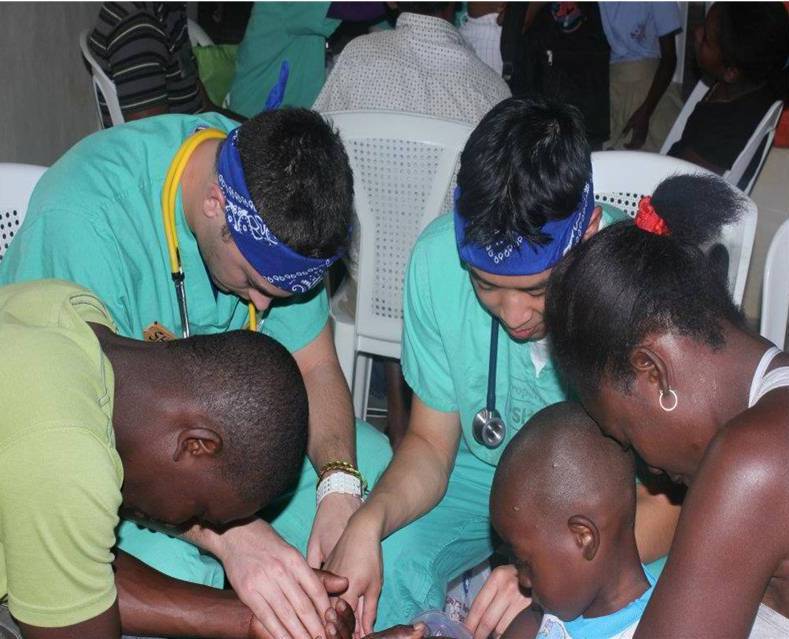
Is humanitarian need blind? In college, my Christian fellowship sponsored a fundraiser for victims of the Southeast Asian earthquake and tsunami, sending money to the explicitly Christian humanitarian relief organization World Vision. During the fundraiser, several people approached the coordinators and expressed relief at being able to donate to a Christian organization. One person said, “I don’t mind donating to a secular organization, but it somehow feels better to give to an organization that shares the same faith.” As one of the organizers, I asked myself, “What’s the difference between secular and faith-​​based groups if they’re doing the same thing? Do you need to be a Christian to hand out food and medical supplies? Can’t we all just work together?” All of these questions and struggles probe the complex issue of college Christian humanitarianism.
Wikipedia.org defines humanitarianism as “an informal ideology of practice, whereby people practice humane treatment and provide assistance to others . . . based on a view that all human beings deserve respect and dignity and should be treated as such.” We colloquially use the term “humanitarianism” to describe the general spirit behind the charity work that goes on in the world, but we must recognize that doing so ignores the fine distinctions between the philosophies that motivate such work. At first blush, these differences seem trivial or even unnecessary. We think, “Surely we can lay aside our prejudices and work together for a common cause.” There is an innate belief in our culture that charitable actions are —or at least can be —transcendent over differences, whether in race, culture, or religious belief. The chorus of the Nickelback song “If Everyone Cared” puts it starkly:
If everyone cared and nobody cried
If everyone loved and nobody lied
If everyone shared and swallowed their pride
Then we’d see the day when nobody died.

After all, does a person who is sick care about the ethnicity of the person administering medicine? Does a person starving to death care about the religion of the person handing out food? Probably not. We tend to assume that acute need is blind in the same way that justice should be blind: unbiased, unassuming, and “fair” to all people and all needs.
But if need is indeed blind, are those seeking to meet those needs equivalently nonpartisan? If the hungry person receiving bread doesn’t care whether the provider is Catholic or Muslim, black or white, a celebrity seeking publicity or simply a well-​​inclined citizen, should we —the donors and the aid workers —care as long as the job gets done? What influence does motivation play in the distribution of aid?
Suppose that we, as potential donors, have highlighted two different humanitarian organizations that we like and would like to donate money to. Both have an excellent track record in terms of financial accountability. One is a Christian organization that intends to ship Bibles and other religious material to afflicted areas (with no coercion involved in the distribution), whereas the other organization is strictly secular and utilizes all funds for emergency supplies. Because of the secular organization’s specialization, it is significantly more efficient with its aid distribution than the Christian organization. Which organization would a Christian be more inclined to fund? The answer depends on personal preference and priorities. The Christian may choose to fund the Christian organization to support a perceived deficiency in spiritual care. Or, the Christian may fund the secular organization in order to more specifically alleviate a particular acute crisis. One would be hard pressed to claim that either choice is superior. However, this example demonstrates that though need may be blind, the donor often is not. We who act are influenced by our religious, ethnic, and cultural backgrounds, resulting in different (and often conflicting) sets of priorities. Note that this example also applies to campaigning for support: should a campus Christian fellowship that desires to help alleviate a current crisis put most of its support and resources in a common and secular campus movement to gather funds or should it pioneer support for an explicitly Christian organization? Is it more important to present a unified campus front or to address specific needs that others may not deem significant?

This is not a hypothetical dilemma; these issues were the same ones my Christian fellowship faced in the after-​​effects of the Southeast Asian crisis of 2005. What is the trade-off between spiritual and physical care? Is it possible to separate the two domains into independently funded organizations, or are they so interrelated that we need religious organizations that specialize in physical care (and vice versa)? How can an organization be culturally sensitive while adhering to a set of religious beliefs? How does an organization that focuses on disabled children compare with one that specializes in emergency disaster relief? Should we (or can we) make these comparisons? Again, the answers seemed to boil down to a matter of priorities. We —as individual donors, campus organizations, churches, and other communities on campus and in our culture —are inclined to believe that the best solution is for each donor to give to the cause that he or she or they feel most inclined towards and allow the organizations to sort themselves out in Darwinian fashion.
But such a response means that we must accept a partisan approach to humanitarian aid, one where different organizations, though well-​​meaning, must compete with one another for scarce resources, where organizations are not equivalent even if their goals are similar, where the philosophy of an organization subtly but directly influences its effects. Such a conclusion is certainly more nuanced than —if not completely contradictory to —the conception of “humanitarianism” as a general spirit of charity and this is especially visible when competing humanitarian organizations have conflicting goals and motivations.
What, then, should be our response as a campus, a religious community, or individuals? The questions behind community service and humanitarian relief are not ones that we encounter often —or perhaps are encountered often enough to desensitize —and thus are easy to ignore. Some have said that a systematic discussion or action on the questions of social justice and action in the context of Christian fellowships skews established political neutrality and that it is therefore better for individuals to pursue these answers for themselves. Yet most Christian fellowships on campus teach a particular perspective on sensitive topics such as gender roles, dating and relationships, and homosexuality. If we can establish a well-​​reasoned, biblical and reasonably “neutral” perspective in these areas, surely we can do so in the area of Christian humanitarianism as well.

As members of the university, it is our responsibility to encourage intellectual exploration and examination. As Christians, we are called to do this in the context of a “gospel worldview,” or the interpretive effect of Christ’s redemption of humanity on all the effects of humanity. It is simpler to shrug our shoulders and walk away or donate a few dollars and deal with a vague sense of discomfort. But a more appropriate response to the lingering questions of Christian humanitarianism is to begin finding their resolutions in the university and with the full blessing, endorsement, and systemic support of the Christian community. For what students are equipped with the time or resources to perform such an endeavor only as individuals? And how nuanced can such an endeavor be if there is no systemic support or encouragement —ideologically, philosophically, or spiritually —for these questionings? If the religious community is a place where students can find balance and perspective for life, shouldn’t that restorative power be brought to bear on the area of service as well?
[This post is a refresh/update of thoughts on an article written in 2007 for another publication.]
David graduated from Princeton University with a degree in Electrical Engineering and received his medical degree from Rutgers – Robert Wood Johnson Medical School with a Masters in Public Health concentrated in health systems and policy. He completed a dual residency in Internal Medicine and Pediatrics at Christiana Care Health System in Delaware. He continues to work in Delaware as a dual Med-Peds hospitalist. Faith-wise, he is decidÂedly Christian, and regarding everything else he will gladly talk your ear off about health policy, the inner city, gadgets, and why Disney’s Frozen is actually a terrible movie.

Leave a Reply